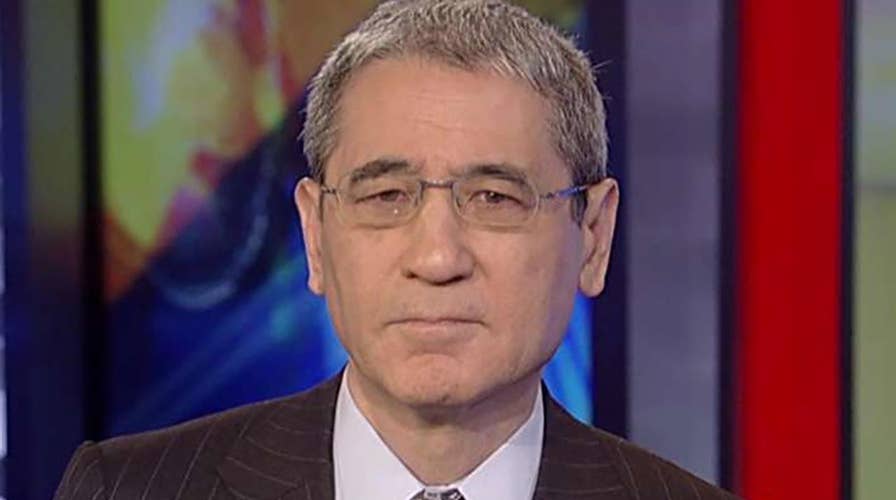Chang: North Korea sanctions working, but more can be done
The Trump administration hit North Korea with new sanctions; 'Nuclear Showdown' author Gordon Chang provides insight on 'Sunday Morning Futures' about North Korea policy.
In a surprise move on Sunday, Pyongyang signaled it was ready to hold discussions with the Trump administration.
“The North Korean delegation said that North Korea is willing to have talks with the U.S. and the North agrees that inter-Korean relations and North Korea-U.S. relations should advance together,” a statement from the Blue House, the office of the South Korean president, said.
The statement, issued after an hour-long meeting between President Moon Jae-in and the North’s Kim Yong Chol in PyeongChang, did not say the topic of the talks would be North Korea’s nuclear weapons program.
Kim is leading an eight-person group that traveled to South Korea on Sunday to attend the closing ceremony of the Winter Olympics.
Kim, now a vice chairman of the Central Committee of the ruling Workers’ Party and in charge of the Party’s United Front Department, was certainly a provocative choice to head the delegation. In 2010, at the time of two deadly attacks, he was the chief of the regime’s Reconnaissance General Bureau.
Seoul blamed the bureau for the sinking of a frigate, the Cheonan, in March of that year—46 killed—and the November shelling of Yeonpyeong Island—four killed, two of them civilians.
About 70 lawmakers of the opposition Liberty Korea Party protested outside the Blue House, the official residence of South Korea’s president. There were also demonstrations at the Demilitarized Zone, close to where Kim was expected to enter South Korea, and at the Games in PyeongChang.
If UN and U.S. sanctions are enforced to their full extent, at some point the regime will understand it has no choice but to give up its most dangerous weapons.
Emotions at the moment are running high. “Kim Yong Chol is a diabolical war criminal who attacked the South,” said Kim Sung-tae, the parliamentary floor leader of that party, in a statement. “He deserves death by hanging in the street.”
Can a war criminal really deliver a message of peace?
The offer from Pyongyang is almost certainly cynical. North Korea has violated every agreement it has inked on its nuclear program. That’s deceit in every decade beginning in the 1980s.
And Kim Jong Un, the current ruler, has even more reason to be untruthful than his grandfather, Kim Il Sung, or his father, Kim Jong Il. As CIA Director Mike Pompeo said in January, the North was only “a handful of months” away from being able to land a nuke in the American homeland. Therefore, the current Kim undoubtedly wants to stall Washington with talks so that he can complete the development of missiles and nukes.
Nonetheless, Vice President Mike Pence this month said Washington was willing to talk with Pyongyang without preconditions. The previous American position, which was established policy during the Bush and Obama years, was that the North, before negotiations could begin, had to agree to honor previous commitments to give up its nuclear arsenal.
With the American concession, talks could begin soon. Both Washington and Pyongyang appear to be on the same page.
And talks this time, surprisingly, could lead to the denuclearization of the North. Why?
Sanctions seem to be working. The North’s foreign currency reserves could run out by October. There are also reports that Office No. 39, the Kim family’s notorious “slush fund,” is drying up.
The primary thrust of Trump administration policy has been to cut off money flows to the regime. On Friday, Treasury Secretary Steven Mnuchin announced sanctions on one individual, 27 entities and 28 vessels in connection with North Korean trade.
Moreover, it appears the Trump administration has bold plans to interdict the North’s shipping on the high seas.
Pence made the promise to talk in exchange for a pledge from President Moon to continue pressuring the North Koreans until, as the vice president told the Washington Post, they “are actually doing something that the alliance believes represents a meaningful step toward denuclearization.”
In the past, Washington has lifted sanctions prematurely. In 2007, for instance, the Bush administration, at the behest of Beijing, returned to North Korea approximately $25 million dollars frozen by the U.S. Kim Jong Il, with the cash in hand, promptly walked out of the China-sponsored Six-Party Talks.
The Trump administration, with its emphasis on sanctions, is unlikely to make that mistake. Ivanka Trump, her father’s representative at the closing ceremony, renewed the American commitment to continue “maximum pressure” when she had dinner with Moon at the Blue House Friday.
Kim Yong Chol’s offer to talk, therefore, may be the product of a realization that the regime has to come to terms with the U.S. If UN and U.S. sanctions are enforced to their full extent, at some point the regime will understand it has no choice but to give up its most dangerous weapons.
Kim Jong Un presides over a tiny economy. The Bank of Korea, the South Korean central bank, estimates that the North’s gross domestic product amounted to $28.5 billion in 2016. Last year, the economy may even have contracted but, in any event, did not grow fast.
Sanctions, therefore, can have a great effect, even if they affect only small amounts of incoming revenue.
The Kim regime may be desperate, but this is no time for Washington—or Seoul—to let up the pressure—even when war criminals deliver peace offerings.

